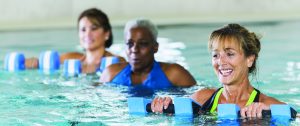 Whether you’re celebrating Valentine’s Day, or just trying to maintain your New Year’s “get fit” resolutions, February is Heart Health Month and a good reminder of the importance of keeping our tickers in top notch. For people with heart and vascular disorders, this is of critical importance.
Whether you’re celebrating Valentine’s Day, or just trying to maintain your New Year’s “get fit” resolutions, February is Heart Health Month and a good reminder of the importance of keeping our tickers in top notch. For people with heart and vascular disorders, this is of critical importance.
In recent years there has been a multitude of studies on the effectiveness of aquatic therapy and the heart. As it turns out, aquatic therapy is not only easier on the joints and bones, but it is easier on the heart and vital for getting a healthy, safe, cardiovascular workout.
So, what is the difference?
Land Therapy is physical therapy achieved through exercise machines, walking, balance programs, stretching and many other forms of rehabilitation to get your body back into moving with fluidity, increasing a greater range of motion, improving your quality of life and achieving a successful remediation of impairments.
Aquatic Therapy is exactly the same as “Land Therapy,” except that it is all accomplished under warm water that is usually chest deep.
While both are extremely beneficial, many people are better suited for water rehabilitation due to its soothing effects on the entire body including the heart. The resistance of the water against the body increases cardiovascular circulation. Not only is aquatic therapy easy on the joints and muscles, but also the buoyancy allows individuals to exercise for longer periods of time, with more intensity than that of land-based physical therapy.
A prime example of a good candidate would be, if a patient had a vascular stent placed in their leg, they might be better suited to walk on an underwater treadmill, because most likely they will experience a more pleasant workout in the water with little to no pain as opposed to on land. They also would be able to walk farther, and the hydrostatic pressure of the water is proven to assist with edema, which is critical for healing and cardiovascular health.
There have been significant studies on the benefits of aquatic therapy for individuals that suffer from cardiac diseases and disorders. These cases have proven that the level of oxygen in the blood increases in water, which is ideal for most vascular issues. The oxygen consumption (VO2) is three times greater in water than on land. Working large muscle groups leads to this uptake of oxygen or VO2, but doing a lot of running and legwork on land increases the heart rate at a greater level than with water-based therapy. For obvious reasons, maintaining a lower heart rate is ideal for those suffering from any heart ailments.
To find out more about aquatic therapy, please visit, freedomrehabaqautictherapy.com, or call Freedom Rehab at 941-400-1505.









